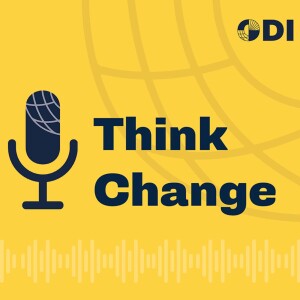

ODI | Think Change
http://feeds.feedburner.com/ODI/WorldForGirlsEpisode List

Corporate humanitarianism? Gaza, Sudan and beyond
The humanitarian system and its principles are being destroyed. Over 1,000 people have been killed seeking aid in the past weeks in Gaza, caught between famine and bullets. With humanitarian actors systematically prevented from reaching people affected by crisis in many contexts, governments are turning to the private sector – security firms, consultants, and ex-military operatives.From Gaza to Sudan to Myanmar, this shift raises urgent questions. Is a privatised model of humanitarianism going to become dominant? What would it mean for humanitarian operations and principles? And how can it be proactively addressed?This episode examines what’s driving governments to outsource aid, and what this means for trust, principles, and the future of humanitarian response. Joshua Craze shares insights from his recent investigation into the operations of for-profit US company Fogbow in South Sudan. We hear how these dynamics play out on the ground in the West Bank from Oxfam’s Bushra Khalidi, and ODI Global’s Dustin Barter unpacks the wider implications for the international aid system.GuestsSara Pantuliano (host), Chief Executive, ODI GlobalDustin Barter, Senior Research Fellow, ODI GlobalJoshua Craze, writer and researcher on South SudanBushra Khalidi, Policy Lead at Oxfam in the Occupied Palestinian TerritoriesRelated resourcesFogbow operations in South Sudan and beyond raise red flags for faltering aid system (The New Humanitarian)Beyond the reset: Five priorities for genuine humanitarian transformation (The New Humanitarian)What does the failure of humanitarianism in Gaza mean? (Blog, ODI Global)The politics of hunger – can famine in Gaza and Sudan be stopped? (Think Change podcast, ODI Global)The future of aid (Resources hub, ODI Global)

Are development finance institutions the new market makers?
This episode examines a challenge at the heart of development finance. Much energy is focused on mobilising more capital in low-income countries and emerging economies, but funding alone isn't enough. A deeper issue persists: there simply aren’t enough bankable projects – ventures that are ready to absorb investments at scale.Traditionally, development finance has been demand-led – waiting for the right opportunities to emerge. But this model is evolving. Some development institutions (DFIs) are now looking to actively help create the very markets we want to invest in.Our recent report explores this shift, highlighting how institutions like British International Investment (BII) and Norfund are stepping in to initiate entirely new commercial ventures in challenging markets. These aim to generate critical investments in sectors such as infrastructure, agriculture and healthcare.So what does it take to build truly investable opportunities from the ground up? Experts discuss how to create sustainable, locally owned ventures that can deliver lasting development impact.GuestsSara Pantuliano (host), Chief Executive, ODI GlobalPaddy Carter, Director of Development Economics, British International InvestmentFrederique Dahan, Director, Development and Public Finance team, ODI GlobalShaun Githuku, Director, Gridworks Development Partners LLPNoah Law, Labour MP for St Austell and Newquay & Member of the International Development Committee, UK ParliamentRelated resourcesDFI sponsorship of new platforms and ventures: why and how? (Report, ODI Global)DFI sponsorship of new platforms and ventures: why and how? (Video of report launch event, ODI Global)Risk, return and impact (Report, British International Investment)Gridworks Development Partners LLP (British international Investment)MedAccess (British International Investment)

Can the debt, nature and climate crises be solved together? Insights from the Expert Review
Climate disasters are intensifying globally, with vulnerable nations facing disproportionate impacts despite minimal contributions to global emissions. From prolonged droughts in East Africa to intensifying cyclones in the Pacific, these events reveal a troubling paradox: As the Expert Review on Debt, Nature and Climate demonstrates, countries must borrow to recover from disasters, yet face financial systems that: Penalise them for climate risks they didn't create Exacerbate vulnerabilities through rising sovereign defaults Fail to support long-term resilience investments This episode examines three critical dimensions: Systemic reforms needed to align debt frameworks with climate reality Distributional challenges preventing finance from reaching frontline communities Innovative proposals to achieve climate justice through financial transformation Guests Moritz Kraemer, Chief Economist, LBBW; Co-Chair, Expert Review on Debt, Nature and Climate Yussuf Hussein, Climate Finance Advisor, Kenya’s Special Envoy on Climate Change Sarah Colenbrander, Director, Climate and Sustainability Programme, ODI Global Resources: Tackling the Vicious Circle: The Interim Report of the Expert Review on Debt, Nature and Climate Healthy Debt on a Healthy Planet: Towards a virtuous circle of sovereign debt, nature and climate resilience Indebted: how to support countries heavily reliant on oil and gas revenues to secure long-term prosperity

How are the aid cuts impacting climate action?
Climate impacts are continuing to intensify. More severe storms, droughts, floods and heatwaves are inflicting devastation on the most vulnerable communities – those who also bear the least responsibility for the climate crisis.But as the need for climate action becomes ever more urgent, international aid is retreating. USAID has been dismantled, whilst wealthy countries across Europe have slashed their aid budgets.This episode asks what the aid cuts mean for the most climate-vulnerable countries. With fiscal space tightening and multilateralism on the decline, guests discuss how governments and international organisations can incentivise more private sector investment, scale up climate finance and channel it to where it’s most needed. We also hear what impact regional partnerships could have in delivering meaningful climate action in this new global landscape.GuestsSara Pantuliano (Chief Executive, ODI Global)Hans Peter Lankes (Deputy Chief Executive, ODI Global)Sara Schonhardt (international climate reporter, Politico)Sir Nicholas Stern (Chair, Grantham Research Institute)Related resourcesA Fair Share of Climate Finance (Project, ODI Global)Revitalising finance for adaptation: what role for the multilateral climate process? (Working paper, ODI Global)Vulnerable nations on the brink: the double shock of aid cuts and US tariff increases (Insight, ODI Global)The relationship between climate action and poverty reduction (Report, LSE)Small change? Our projections for the conflict blind spot in climate finance by 2030 (Insight, ODI Global)

What's Europe's role in a divided world?
At a time of major geopolitical turbulence, Europe finds itself at a crossroads. Long regarded as a pillar of stability and multilateralism, the continent's role in today's increasingly divided world is being tested in numerous ways – as are its key institutions.There is a new fragility to Europe's external relationships – underscored by Trump's threats to impose tariffs on EU imports, and by disagreements on security guarantees for Ukraine.This episode dissects Europe's changing role and influence in the world today. Experts explore how European nations can come together to face external threats effectively, and identify some immediate opportunities for change.Among our guests is ODI Europe’s Board Chair, Ambassador João Vale de Almeida, who shares ideas put forward in his thought-provoking new book The Divorce of Nations: A Diplomat’s Inside View as the Global Order Collapses. We also hear from historian and political writer Timothy Garton Ash, and Anand Menon, Professor of European Politics and Foreign Affairs at King’s College London.GuestsSara Pantuliano (host), Chief Executive, ODI GlobalTimothy Garton Ash, Professor of European Studies, University of OxfordAnand Menon, Professor of European Politics and Foreign Affairs, King’s College London & Director, UK in a Changing EuropeJoão Vale de Almeida, Chair of the ODI Europe Board and a former European Union Ambassador to the United States and the United NationsRelated resourcesThe Divorce of Nations: A Diplomat’s Inside View as the Global Order Collapses (João Vale de Almeida, The History Press, 2025)Homelands: A Personal History of Europe (Timothy Garton Ash, Penguin Random House, 2023)How is Ukraine redefining global security? (Think Change podcast, ODI Global)Europe and the new world order: an updated approach to foreign engagement (Briefing paper, ODI Global)Can ‘the West’ be trusted? The future of European humanitarian aid (Insight, ODI Global)Navigating aid and national interest in Ukraine: the development toolbox of European donors (Insight, ODI Global)
You may also like
Create Your Podcast In Minutes
- Full-featured podcast site
- Unlimited storage and bandwidth
- Comprehensive podcast stats
- Distribute to Apple Podcasts, Spotify, and more
- Make money with your podcast



